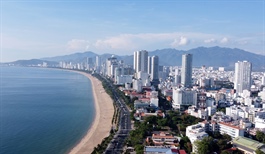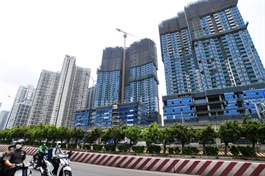Real estate market prepares for renewal from 2025
Real estate market prepares for renewal from 2025
Along with positive changes in the macroeconomic picture, real estate players are pining for 2025 when new laws come into play.

Nguyen Thi Bich Ngoc, director of Sen Vang Group, said that the revised laws on Housing and on Real Estate Business have regulations and policies to better protect the interests of buyers and can help increase transparency and safety for real estate transactions.
The two laws are expected to come into effect at the start of next year. “Especially, the provision that overseas Vietnamese who hold Vietnamese citizenship and have the right to buy, sell, and do business in real estate like nationals living here will help push demand for real estate purchases,” Ngoc added.
However, according to Ngoc, the legal corridor being adjusted to become increasingly strict can increase costs for both investors directly participating in the market, and developers and leasers of housing and tourism real estate.
“The combination of rising costs and increasingly limited supply could worsen property price increases, especially in urban areas.
Therefore, low- and middle-income groups in large cities will continue to have difficulty accessing housing,” she added.
One of the most notable points in the revised Law on Housing is that there is no regulation on the duration of apartment ownership.
Le Hoang Chau, chairman of the Ho Chi Minh Real Estate Association, emphasised that this point has met the wishes and needs of apartment owners who remain worried about the procedures of expanding building lifespans when they expire.
“The revised Law on Housing also provides a clearer legal framework for investors developing social housing in aspects such as exemption of land use fees/land rent, no requirement to reserve 20 per cent of land in commercial projects for social housing, and adding businesses and cooperatives in industrial zones onto the list of social housing users,” said Chau.
In a report released in December, Vietcap Securities analysed that the revised Law on Real Estate Business stipulates stricter legal requirements for investors before they can open for sale future projects and collect money from home buyers.
“Although this forces developers to spend a lot of time to meet all the necessary legal requirements and start construction before launching sales, this will protect home buyers from the risk of investors mobilising capital from customers before completing the necessary legal procedures,” said the report.
Meanwhile, VNDirect said the revised laws on Real Estate Business and on Housing stipulate that investors need to demonstrate stronger financial capacity and the ability to complete the legal system and project implementation.
“This will protect customers’ interests, promote home buying demand, and ensure a healthy development environment for the real estate market in the long term, as well as helping businesses create better competitive advantages,” it said.
Nguyen Mai Phuong, partner for KPMG in Vietnam, said that to be attractive enough for foreign investment, the Vietnamese real estate market requires a clear and stable legal corridor.
“There should not be any overlap in the scope of application of the regulations. As such, the problems in regulations need to be entangled gradually to ensure foreign investors can imagine the applicable regulations and a clear-cut procedure when they invest in the Vietnamese market without worrying about having their projects frozen due to administrative procedures,” Phuong said.
In addition, there should be a coordination mechanism among competent authorities relating to real estate business activities to guide foreign investors in the investment process in Vietnam.
“This idea can be executed in various forms, such as an online portal that lists the investment conditions, required licences and permits, the order of each procedure at each competent authority, and a public mailbox to receive inquiries from investors when problems arise,” Phuong said.
“With the presence of a coordination mechanism to resolve problems as above, the administrative procedures of real estate projects can be carried out more effectively,” said Phuong.




























